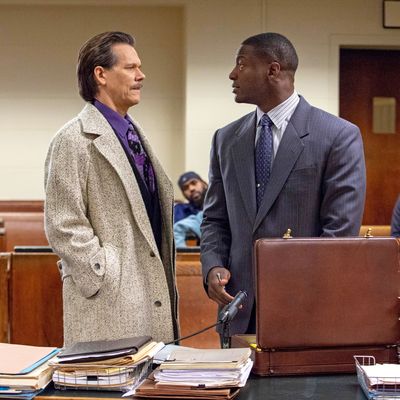
Everyone involved with Showtime’s new crime show City on a Hill seems to know their brief. The show looks and feels and sounds exactly like it should — it’s a series about Boston in the ’90s, and everyone walks around wearing oversize blazers and wide-striped shirts, lurking in dark corners, cracking terribly racist epithets and accusing each other of being pussies. There are Boston accents in all the places where Boston accents should be (Kevin Bacon as corrupt FBI agent Jackie Rohr, and the passel of crime-family baddies led by Jonathan Tucker as Frankie Ryan). There are no Boston accents where accents should not be (Aldis Hodge as Decourcy Ward, an up-and-coming district attorney who’s arrived from the outside to sweep things clean). There are priests, and robbers wearing Jason Voorhees masks, and grand juries being empaneled. There are women, mostly wives, who just wish they knew what their men were thinking.
What City on a Hill lacks is much of a reason to exist at this particular moment in time. Not all TV needs to have a point, of course; pure entertainment is more than enough reason for something to exist. And for viewers who are entertained by corrupt law enforcement agents who still call people “spics” and “porch monkeys” and then grin when they shake down their bookies, City on a Hill will do the job nicely. Hearkening back to a more racist, more physically criminal time is not the series’s only avenue for entertainment, either. There’s a painstaking shot of a woman walking down a hallway, focused intently on the way her bra strap falls down her shoulder. Frankie Ryan and his brother Jimmy (Mark O’Brien) have to get rid of some stolen money, and do it in fantastically drunken style, gambling away their earnings at a high-class basement establishment. If you want to be entertained by Kevin Bacon worrying that he’s caught herpes from a prostitute, that’s another available option.
But in its first three episodes, City on a Hill doesn’t quite manage to sketch out the broad institutional framework that underpins a show like The Wire, and it also fails to make any of its primary characters especially endearing in a way that buys the show time for the rest of its mechanisms to click into place. The characters are functional. There are some sparks here and there that leap out from the broad-lapeled background, especially Aldis Hodge’s Ward, and the sense that Jonathan Tucker’s Ryan is a barely quenched explosive about to combust at any moment. But at this early stage none of the cast has coalesced into the kind of magical chemistry that makes a story feel worthwhile even if it’s not especially innovative.
City on a Hill is oddly, unmistakably loving. It’s a depiction of rough-and-tumble Boston, a Boston of yesteryear, that feels distinctly nostalgic for the time of cash stacked inside holes in the wall and brotherly bands of men who knock over armored vehicles. And it’s hard to know of any other reason why City on a Hill is being made right now, except that it is a passion project by people drawn to that vision of the city — and here it’s worth noting that City on a Hill’s producers include Matt Damon and Ben Affleck, two men whose careers were shaped by writing and starring in Good Will Hunting, a movie also rooted in Boston’s working class. But for all of its bigness and lack of nuance, Good Will Hunting also casts a much more wary eye on the classist assumptions of Boston’s cultural divides. City on a Hill has no interest in that kind of analysis; its characters will never try to escape. It’s almost a fairy tale of a time gone by, when crime was committed by good working-class men, and corruption was sort of lovable. Or at the very least, when corruption coexisted with competence.
It would be a mistake to discard any moment in history as useless or incapable of speaking to the present. That kind of disregard tends to be based on assumptions that could stand to be reexamined. But City on a Hill does not seem interested in unpacking elements of ’90s Boston in a way that feels any different from most other crime shows, nor is it uncovering a vision of Boston that felt in danger of being lost to pop cultural memory. (Someone still has a DVD of The Departed lying around here somewhere, right?) Unless City on a Hill figures out how to distinguish itself further, unless it sheds the nostalgic murk and lands on some sharper purpose than “Hey, remember when people in Boston could say the N-word with impunity?” it’s going to be hard to find a reason to keep watching.


